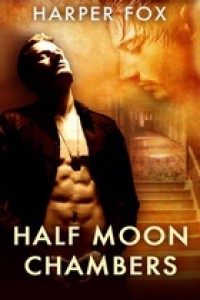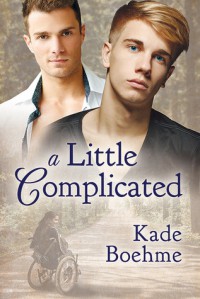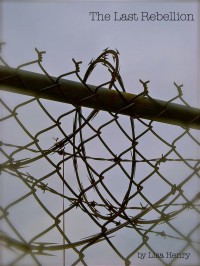20
Followers
15
Following
Vanessa's Reads
I'm a writer who reads a lot. I get crushes on words. I can be NSFW. Come here, let me smell your books.
 There were a lot of things I enjoyed about this book. A deep, gritty worldbuilding. UST for days... Rich plottyness.There were some problematic issues: the portrayal of the women in this story felt relegated to objectification and plot device. In the case of Carla, both. I would have loved to see more agency from the female characters, but especially Carla.However, as a whole, i found the plot enjoyable, the romantic angle was lovely, and the sexual tension made me all dizzy and swoony.Recommended for fans of sexy sci-fi dystopian fiction
There were a lot of things I enjoyed about this book. A deep, gritty worldbuilding. UST for days... Rich plottyness.There were some problematic issues: the portrayal of the women in this story felt relegated to objectification and plot device. In the case of Carla, both. I would have loved to see more agency from the female characters, but especially Carla.However, as a whole, i found the plot enjoyable, the romantic angle was lovely, and the sexual tension made me all dizzy and swoony.Recommended for fans of sexy sci-fi dystopian fiction
 Hawt. I didn't *love* this as much as the first one, but it was really fun to see how James and the Professor started their dirty games. :D
Hawt. I didn't *love* this as much as the first one, but it was really fun to see how James and the Professor started their dirty games. :D
 What a gorgeous book. Okay, so, I'll be the first to admit, I am not sure why I bought this book. Lawd knows cop stories ain't my thing. BUT... Harper Fox? She is so my thing. So I probably bought this because I've always loved her voice. But since I downloaded it in epub???? it got opened in ibooks instead of kindle and I completely forgot about it. I found it this weekend, so yay! Book!Harper Fox's voice is not for everyone. Unlike much of the popular M/M market, she has a much more literary style, even when chasing baddies and drug dealers etc. etc. So she took a storyline which would honestly not usually appeal to me, and she made it bleak and beautiful and full of all this existential (and yes, y'all, I'm talking in the Sartrian sense here) observation.The sartrian stuff: Okay, so here's a quote from old Jean-Paul himself "...man first of all exists, encounters himself, surges up in the world – and defines himself afterwards." THIS is Vince's story. Right there. He exists (and is injured), encounters himself through Rowan's eyes and art, surges up in the world (NO SPOILERS) and defines himself afterward. There is a scene in this book where Vince finds Rowan's sketches and sees himself through the eyes of someone who loves him. And it's a shocking moment for him because he's sort of detached from his own sense of worth since he was shot, and now he is seeing his worth sketched out by the man he loves. And it's beautiful.The suspense plot was pretty good, and I really didn't get how either of our guys were going to be heroes until they both were and it was great!(And the sexy stuff was pretty hot.)I would recommend for fans of rom-suspense, anyone who likes more dense, literary writing, and those who don't mind a bit of philosophy slipped in between the pages of their sexy reads.
What a gorgeous book. Okay, so, I'll be the first to admit, I am not sure why I bought this book. Lawd knows cop stories ain't my thing. BUT... Harper Fox? She is so my thing. So I probably bought this because I've always loved her voice. But since I downloaded it in epub???? it got opened in ibooks instead of kindle and I completely forgot about it. I found it this weekend, so yay! Book!Harper Fox's voice is not for everyone. Unlike much of the popular M/M market, she has a much more literary style, even when chasing baddies and drug dealers etc. etc. So she took a storyline which would honestly not usually appeal to me, and she made it bleak and beautiful and full of all this existential (and yes, y'all, I'm talking in the Sartrian sense here) observation.The sartrian stuff: Okay, so here's a quote from old Jean-Paul himself "...man first of all exists, encounters himself, surges up in the world – and defines himself afterwards." THIS is Vince's story. Right there. He exists (and is injured), encounters himself through Rowan's eyes and art, surges up in the world (NO SPOILERS) and defines himself afterward. There is a scene in this book where Vince finds Rowan's sketches and sees himself through the eyes of someone who loves him. And it's a shocking moment for him because he's sort of detached from his own sense of worth since he was shot, and now he is seeing his worth sketched out by the man he loves. And it's beautiful.The suspense plot was pretty good, and I really didn't get how either of our guys were going to be heroes until they both were and it was great!(And the sexy stuff was pretty hot.)I would recommend for fans of rom-suspense, anyone who likes more dense, literary writing, and those who don't mind a bit of philosophy slipped in between the pages of their sexy reads.
 Lovely werewolf story with an unusual take: the lone wolf. Well paced, slow-burn romance, really building the tension well, and a satisfying HFN ending. Omniscient narration was a little jarring at times, but by the end, i grew used to it. Definitely would recommend for anyone looking for a different sort of shifter romance.
Lovely werewolf story with an unusual take: the lone wolf. Well paced, slow-burn romance, really building the tension well, and a satisfying HFN ending. Omniscient narration was a little jarring at times, but by the end, i grew used to it. Definitely would recommend for anyone looking for a different sort of shifter romance.
 I love the Southern flavor to Kade's writing and this story is adorable. Editorial issues are significant. I would recommend for someone looking for a lighthearted read if they are able to read past those issues.
I love the Southern flavor to Kade's writing and this story is adorable. Editorial issues are significant. I would recommend for someone looking for a lighthearted read if they are able to read past those issues.
 I read this three times.I read it, then i dragged my finger across the screen along the bottom, taking me to the beginning to read it again. The last time i remember re-reading anything so immediately, I was twelve years old and had just finished Marion Zimmer Bradley's the Firebrand, a book which has been a favorite for decades.After reading it the second time, I needed to think about what I was going to say about it, because i had all these mind-jumbles going on. Then i felt like i'd waited too long to review it, so I read it again.So lets go with the obvious--this story is told in a letter from one man to another. It's told in a quiet, confessional voice, first person to second. It's almost like Antho was writing a diary to someone else, in the form of a love letter. It's also a goodbye. I loved that Julio chose to tell the story this way. It feels intimate, and it feels a little voyeuristic, like maybe we found this letter and are reading someone else's secrets. It sets the mood perfectly.The worldbuilding--anyone who has ever slaved away, unappreciated, in a cubicle probably pictures what i did: stretches of monotone walls, bleak, depressing, unforgiving, unrelenting. And the orbs? Creepy! So once I have this corporate tower nobody image, it's so easy to see why the assassin moves Antho: he's different. He has purpose. He's new, and Antho is the guy who doesn't get to have new, different, purposeful. The assassin is a bit of violent poetry in a bland-prose world.The relationship: Antho takes care of the assassin because he's fascinated, because he's lonely, amd because it gives him purpose and meaning in a desperately lonely life.Beautiful, and haunting, and a reminder to find beauty where we can in those moments when we aren't alone.
I read this three times.I read it, then i dragged my finger across the screen along the bottom, taking me to the beginning to read it again. The last time i remember re-reading anything so immediately, I was twelve years old and had just finished Marion Zimmer Bradley's the Firebrand, a book which has been a favorite for decades.After reading it the second time, I needed to think about what I was going to say about it, because i had all these mind-jumbles going on. Then i felt like i'd waited too long to review it, so I read it again.So lets go with the obvious--this story is told in a letter from one man to another. It's told in a quiet, confessional voice, first person to second. It's almost like Antho was writing a diary to someone else, in the form of a love letter. It's also a goodbye. I loved that Julio chose to tell the story this way. It feels intimate, and it feels a little voyeuristic, like maybe we found this letter and are reading someone else's secrets. It sets the mood perfectly.The worldbuilding--anyone who has ever slaved away, unappreciated, in a cubicle probably pictures what i did: stretches of monotone walls, bleak, depressing, unforgiving, unrelenting. And the orbs? Creepy! So once I have this corporate tower nobody image, it's so easy to see why the assassin moves Antho: he's different. He has purpose. He's new, and Antho is the guy who doesn't get to have new, different, purposeful. The assassin is a bit of violent poetry in a bland-prose world.The relationship: Antho takes care of the assassin because he's fascinated, because he's lonely, amd because it gives him purpose and meaning in a desperately lonely life.Beautiful, and haunting, and a reminder to find beauty where we can in those moments when we aren't alone.
 1
1
 Buddy read with Liza GainesHmm. I'm not going to finish this one. Not admiring the behavior of any of the characters, and this love triangle thing is not my scene.
Buddy read with Liza GainesHmm. I'm not going to finish this one. Not admiring the behavior of any of the characters, and this love triangle thing is not my scene.
 There's so much to love about this book. In a genre (romance) where youth and beauty are damn near fetishized, we have two protagonists who have retired after long military careers. Fifty-two and forty-eight years old. I can't begin to say how positively that colors my impression of the author--she strode right out on that limb, no fucks given, and it was brilliant.The cast of secondary characters in this story sprawls around like a pile of puppies, and that's sort of how I felt about Kim and Billy and the Ho-Ho sisters and juan and All. Those. Artists. A puppy pile, squirming and wriggling and occasionally tugging each other's ears before they all collapse in an exhausted heap in John's garage. And i loved it. There was genuine affection and a little conflict between them, and it never felt forced or like they threw in some extra characters just to round out the cast. They were John and Gabriel's family.The plot is a quiet one, dealing with the end of a marriage, the beginning of a life after the military, and a series of episodes of violence committed by a predator. It's laid out methodically, just like John laying out the evidence he collected on the assaults. It culminates in a showdown at Ho-Ho's, which, come on, is a way cool place for a book to have it's climax. I'd recommend this to anyone, but especially those who want a smart and sweet story with lots of love to go around.
There's so much to love about this book. In a genre (romance) where youth and beauty are damn near fetishized, we have two protagonists who have retired after long military careers. Fifty-two and forty-eight years old. I can't begin to say how positively that colors my impression of the author--she strode right out on that limb, no fucks given, and it was brilliant.The cast of secondary characters in this story sprawls around like a pile of puppies, and that's sort of how I felt about Kim and Billy and the Ho-Ho sisters and juan and All. Those. Artists. A puppy pile, squirming and wriggling and occasionally tugging each other's ears before they all collapse in an exhausted heap in John's garage. And i loved it. There was genuine affection and a little conflict between them, and it never felt forced or like they threw in some extra characters just to round out the cast. They were John and Gabriel's family.The plot is a quiet one, dealing with the end of a marriage, the beginning of a life after the military, and a series of episodes of violence committed by a predator. It's laid out methodically, just like John laying out the evidence he collected on the assaults. It culminates in a showdown at Ho-Ho's, which, come on, is a way cool place for a book to have it's climax. I'd recommend this to anyone, but especially those who want a smart and sweet story with lots of love to go around.
 I liked this story, I've read a few of the M/F romances set in the same worldbuilding, but I *think* this stands alone nicely. It was a sweet story but the part that stands out most in my mind is the smokin' hot first kiss--I'm a sucker for a good kiss scene.
I liked this story, I've read a few of the M/F romances set in the same worldbuilding, but I *think* this stands alone nicely. It was a sweet story but the part that stands out most in my mind is the smokin' hot first kiss--I'm a sucker for a good kiss scene.
 Oh, this was a hard one for me to read, but i am glad I did.First, I'll just say I read very few dub-con or non-con books. Very, very few. The ones I do read tend to be from a handful of authors who I trust completely. Lisa Henry is one of those. I will pretty much read anything she writes, even if the subject matter is disturbing to me personally.This story was very well written, but I did struggle to read some of the more graphic rape and torture scenes. I very much liked the portrayal of Miller (the torturer) and his fatigue with the war, his fascination with Rho, his desire to hear Rho speak his own name, etc. I found him a very interesting character.I would recommend this to other readers with the caveat that it could be triggering to victims of rape or violence.
Oh, this was a hard one for me to read, but i am glad I did.First, I'll just say I read very few dub-con or non-con books. Very, very few. The ones I do read tend to be from a handful of authors who I trust completely. Lisa Henry is one of those. I will pretty much read anything she writes, even if the subject matter is disturbing to me personally.This story was very well written, but I did struggle to read some of the more graphic rape and torture scenes. I very much liked the portrayal of Miller (the torturer) and his fatigue with the war, his fascination with Rho, his desire to hear Rho speak his own name, etc. I found him a very interesting character.I would recommend this to other readers with the caveat that it could be triggering to victims of rape or violence.
 If you've read King Perry, you might have an expectation out of this book. I read them back to back, so I was comparing them pretty closely. The prose in King Mai is a little more mundane. The adventure is a little more wholesome. It's also funnier, and I think Manning got some things right with comedic timing in King Mai to make it more of a fun read.I did have a moment in this story I *really* disliked-- I really detest the (all too common) characterization of victims of childhood sexual abuse as "damaged" or broken, or incapable of leading normal lives. I also realize this is me bringing Perry into Mai, because that bit of Vin's backstory isn't mentioned in this book, but really, I can't help but get my back up at that characterization. but for the most part found the story enchanting and really fun to read.I will say this--the food in this book grossed me out. I can't handle the corndog in the back pocket thing or corn dogs in general, and the thing with the cake at the end, EW. So to save my sanity, I just started looking at all the food references as farce, and that made the book even funnier. Well done, Manning, you grossed me into laughing.But, the real gift in this story is Cookie Night. Cookie Night made me bawl like a baby.
If you've read King Perry, you might have an expectation out of this book. I read them back to back, so I was comparing them pretty closely. The prose in King Mai is a little more mundane. The adventure is a little more wholesome. It's also funnier, and I think Manning got some things right with comedic timing in King Mai to make it more of a fun read.I did have a moment in this story I *really* disliked-- I really detest the (all too common) characterization of victims of childhood sexual abuse as "damaged" or broken, or incapable of leading normal lives. I also realize this is me bringing Perry into Mai, because that bit of Vin's backstory isn't mentioned in this book, but really, I can't help but get my back up at that characterization. but for the most part found the story enchanting and really fun to read.I will say this--the food in this book grossed me out. I can't handle the corndog in the back pocket thing or corn dogs in general, and the thing with the cake at the end, EW. So to save my sanity, I just started looking at all the food references as farce, and that made the book even funnier. Well done, Manning, you grossed me into laughing.But, the real gift in this story is Cookie Night. Cookie Night made me bawl like a baby.
 When you read King Perry, it's absolutely clear that Edmond Manning loves words with all his love. The imagery and the rhythm in his writing is masterful. He teases you along with these rich descriptions that feel sort of detached from time and space, and then he gives you a little slap of "San Francisco, 1999. Keep it real."This book is Perry's journey, but it is narrated by Vin, and Vin is unreliable--you think you're in on what Vin has planned because you're reading his voice? No. No. You're reading in his voice, but you're on Perry's ride, and Vin isn't going to go any easier on you than he is on Perry. Don't try to guess what he's up to, because Perry doesn't get to know and you don't either.This book's plot is wild and manic and trippy and just sprawls out on all these little mini-vacations that turn into one big inner monomyth that culminates in a naked-and-fucking cello concert at dawn.Recommended because of all of that and to everyone.
When you read King Perry, it's absolutely clear that Edmond Manning loves words with all his love. The imagery and the rhythm in his writing is masterful. He teases you along with these rich descriptions that feel sort of detached from time and space, and then he gives you a little slap of "San Francisco, 1999. Keep it real."This book is Perry's journey, but it is narrated by Vin, and Vin is unreliable--you think you're in on what Vin has planned because you're reading his voice? No. No. You're reading in his voice, but you're on Perry's ride, and Vin isn't going to go any easier on you than he is on Perry. Don't try to guess what he's up to, because Perry doesn't get to know and you don't either.This book's plot is wild and manic and trippy and just sprawls out on all these little mini-vacations that turn into one big inner monomyth that culminates in a naked-and-fucking cello concert at dawn.Recommended because of all of that and to everyone.
The Rebuilding Year
 Okay, so the first 65% of this book is five stars amazing. The last 35% is off the walls over the top creys. So yeah, a solid four stars and a couple of raised eyebrows. Here's why: kaje Harper has a great voice and writes really endearing characters. Really truly great characters. The plot got crazy weird at the end but what the hell, it was a fun ride. Recommended for the darling straight guys who turned out to be gay after all, the adorbs teenage son who was almost too surly to live, and the super weird college campus hijinks(!)Cynthia can go to hades.
Okay, so the first 65% of this book is five stars amazing. The last 35% is off the walls over the top creys. So yeah, a solid four stars and a couple of raised eyebrows. Here's why: kaje Harper has a great voice and writes really endearing characters. Really truly great characters. The plot got crazy weird at the end but what the hell, it was a fun ride. Recommended for the darling straight guys who turned out to be gay after all, the adorbs teenage son who was almost too surly to live, and the super weird college campus hijinks(!)Cynthia can go to hades.
Screwing the System
 Very cute and hot... The last chapter didn't quite work for me, but as a whole the book was very nice.
Very cute and hot... The last chapter didn't quite work for me, but as a whole the book was very nice.


